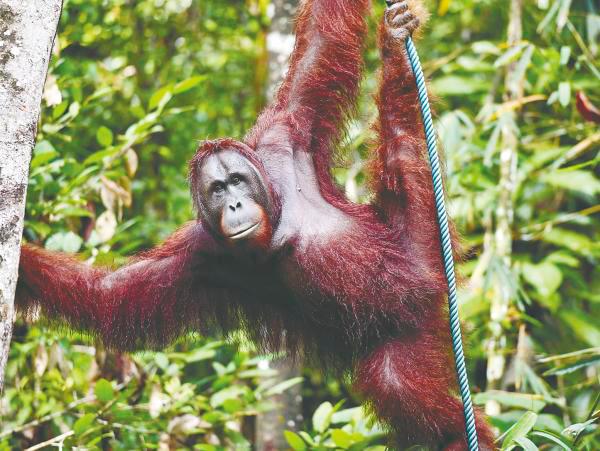RECENTLY, Plantation and Commodities Minister Datuk Seri Johari Abdul Ghani announced that Malaysia aims to introduce “orangutan diplomacy” to palm oil trading countries as a show of concern towards biodiversity conservation.
Akin to the “panda diplomacy” created by China, the move intends to prove to the world community that Malaysia is always committed to biodiversity conservation.
World Wide Fund for Nature-Malaysia (WWF-Malaysia) is of the opinion that a more effective way for biodiversity and orangutan conservation is through improving forest management, prioritising in-situ orangutan conservation, supporting sustainable palm oil production and increasing international funding for conservation efforts in developing countries.
The Bornean orangutan has been listed as critically endangered in the International Union for Conservation of Nature status since 2016. Being critically endangered means the species faces a high risk of extinction in the wild if population decline continues.
While the population of the Bornean orangutans have stabilised in Sabah and Sarawak in recent decades, there are threats that still need to be managed. These threats come in the form of climate change, forest fires, forest fragmentation, conversion of forests for agriculture, mining and settlement.
The best way to showcase Malaysia’s commitment to orangutan conservation is to conserve any remaining natural forests that are habitats for orangutans.
In Sarawak, forests with orangutans are protected, with almost 2,000 of them making these areas their home.
In Sabah, a stable population comprising more than 70% of the remaining 11,000 orangutans is found in forest reserves and protected areas that cover half of Sabah’s total land mass.
However, in eastern Sabah, the population in the Tabin Wildlife Reserve has declined by about 30%, due to surrounding forest loss and conversion into plantations.
To address these challenges of deforestation and habitat loss, WWF-Malaysia advocates for a living landscape approach in areas of high biodiversity involving the protection of forests, the creation of wildlife corridors to connect fragmented forests or the restoration of degraded forests.
In these landscapes, plantation companies should embrace certification and sustainability principles to ensure the conservation of orangutans, and promote peaceful coexistence between people and orangutans.
Specifically, they should:
Protect existing forest areas within plantations and enrich them by planting suitable fruit trees, which provide food for orangutans.
Establish wildlife corridors that connect these forest patches enabling orangutans to move freely and maintain genetic diversity.
Allow orangutans to travel through plantations to access forest islands within plantations, also known as “stepping stones”, ensuring gene flow and minimising isolation.
Prevent the harm or capture of orangutans as close contact with them may increase the risk of zoonotic disease transmission.
However, it is not sufficient to merely conserve the orangutans living in isolation within the palm oil plantation landscape. Inbreeding among the same population group would cause a lack of genetic variation, and eventually local extinction.
To maintain genetic diversity, it is crucial to establish wildlife corridors that connect these forests within palm oil plantations to the larger forest reserves and protected areas.
The goal is for the smaller population groups to connect with the larger population groups living in the larger forested areas.
We see this happening in Sabah where some palm oil plantation companies have set land aside to connect fragmented forests.
The challenge is to upscale this level of connectivity across forested areas that are separated by great distances. Protecting high-conservation areas within plantation landscapes, effective management of protected areas and restoring degraded habitats and forest connectivity in the broader landscapes require costly measures.
On this, WWF-Malaysia calls for greater international support for conservation efforts in orangutan-range countries, such as Malaysia.
Punitive measures, such as penalties and criticism, often lead to defensiveness and scepticism rather than fostering positive change. Instead, a focus on economic incentives and support can encourage countries with tropical forests to prioritise conservation.
To create meaningful change, substantial global resources should be mobilised to support biodiversity conservation efforts in developing countries. Under the UN Convention on Biological Diversity, the Global Biodiversity Framework aims to mobilise US$200 billion (RM947 billion) per year for biodiversity, including US$30 billion through international finance.
However, past commitments have often fallen short, leaving developing countries with the burden of conservation without adequate support from developed nations.
Given the critically endangered status of the Bornean orangutans, WWF-Malaysia advocates for in-situ conservation, and urges trading partners and the international community to provide support to Malaysia, and for companies to shift their paradigm on orangutan conservation.
Rather than sending orangutans abroad, this approach ensures the survival of the species and promotes responsible conservation practices and sustainable production.









